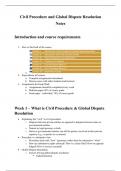Samenvatting
Summary Civil Procedure & Global Dispute Resolution Notes
Hello everyone :) This document is a good overview of the Civil Procedure & Global Dispute Resolution course for Global Law students. It has been prepared with information from clips and reading materials for the course, as well as class lectures. As the course is based on individual resear...
[Meer zien]




